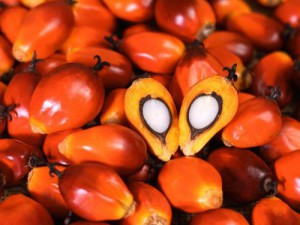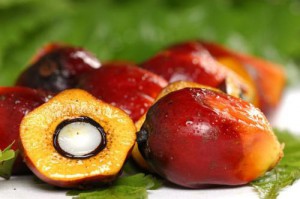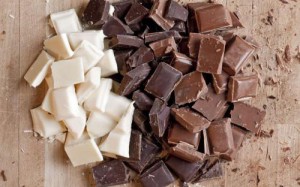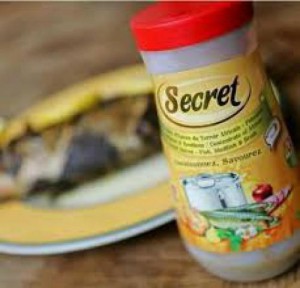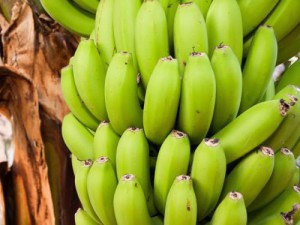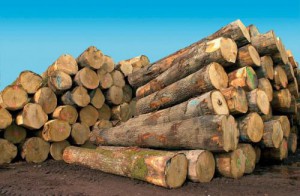
In 2nd quarter 2017, Cameroon imported 2,000 tons of palm oil from Gabon
Agro-industrial member companies of the Association of Cameroonian oilseed refiners of Cameroon (Association des Raffineurs des Oléagineux du Cameroun - ASROC), have imported 2,000 tons of crude palm oil from Gabon, between May and June 2017, we learn from internal sources of this professional grouping.
According to our sources within ASROC, the sale price of this Gabonese raw material is much cheaper than that of Malaysian imports, which generally allow Cameroon to bridge the structural deficit in production estimated at 100,000 tons for years now, but which has officially attained 130,000 tons in the last two years.
This price advantage, explained by the proximity between Cameroon and Gabon (the region of South Cameroon borders Wolou Ntem in Gabon), could soon make this CEMAC country the principal supplier of Cameroonian palm oil refiners: in view of investments made there by the agro-industrial company Olam. As a reminder, Cameroon has become an importer of Gabonese palm oil from the Olam refinery, located in Awala, since October 2016. The biggest CEMAC economy, which will officially import 96,000 tons of palm oil in 2017, to satisfy the needs of local refiners, received an initial consignment of around 300 tons at that time.
Brice R. Mbodiam
Cameroon: Socapalm pleading with the government to get an increase higher than 30% on the price of palm oil
On 11 May 2017, the Managing Director of the Société Camerounaise de Palmeraies (Socapalm), Dominique Cornet, made a request to the Cameroonian Minister of Trade, Luc Magloire Mbarga Atangana, for this government member in charge of approving the price of some mass consumption products, to substantially increase the selling price of crude palm oil to processing industries and households.
Arguing that crude palm oil prices have remained frozen in the country for 10 years, the MD of Socapalm, a company owned by the French-Belgian group Socfin, is proposing to move the selling price to industries from FCfa 450,000 to 600,000 per ton excluding taxes, which would lead to an increase of over 30%. According to the Association des Raffineurs des Oléagineux du Cameroun (Asroc - Association of Oleaginous Refiners of Cameroon), this increase should have an impact on the selling price paid by households, which would then move from FCfa 600 per litre to FCfa 750, an increase of 25%.
According to Socapalm, the necessity of this price increase is justified by the increase in its expenses, the wish to replenish the coffers of the company to launch an investment plan, or the increase in the selling price per ton on the international market to 843 dollars during the first quarter 2017. Reasons dismissed by Asroc.
Indeed, based on the trend in international prices for crude palm oil over the 3 January to 20 June 2017 period, Asroc points out that “contrary to the claims of Socapalm, the average selling price per ton of crude palm oil during the first quarter 2017 was 712,52 dollars and not 843 dollars” as suggested by the leader in the crude palm oil production in Cameroon.
The group of local refiners specifies, moreover, that Socapalm, who is announcing a new investment plan has still not respected the plan drawn up in 2008, which enabled it to increase the selling price for crude palm oil from FCfa 360 to 450. Instead of the planned expansion of the plantations, to increase the production, Asroc even revealed that Socapalm rather used the funds gained during the last price increase, to develop rubber plantations, to the detriment of oil palms.
Commenting on the increase in the expenses invoked by Socapalm, and which would suggest financial difficulties in the company, Asroc reminds that the company declared “profits of FCfa 6 billion in 2016, with the distribution of FCfa 5 billion in dividends”. Indeed, Socapalm rather declared, FCfa 5 billion in earnings after tax at end 2016, in decrease by over FCfa 1 billion compared to the FCfa 6.4 billion earned in 2015. Based on the financial statements of the company, the dividend to be distributed was FCfa 6.8 billion, Socapalm having decided to make a withdrawal from its “retained earnings”, to add to the amount to be shared between shareholders for 2016.
On 27 June, a meeting related to this topic was held at the Ministry of Trade. The following day, a letter from the office of the Prime Minister, was transmitted to Minister Mbarga Atangana, as a report of the “denunciations” contained within. Said correspondence, written on 13 June by an NGO called “Observatoire du développement sociétale” (Social Development Monitoring Centre), accuses the Minister of Trade of jeopardising the work of palm oil producers by authorising imports, while, this NGO reveals, the local production is “sufficient”. However, experts agree on the fact that the production deficit in Cameroon, which peaked at 100,000 tons for year, has now reached 130,000 tons for 2 years.
Even better, this NGO, whose correspondence addressed to the Prime Minister on 13 June has as attachment the letter addressed on 11 May to the Minister of Trade by Socapalm, is practically begging the government to grant to the palm oil market leader in Cameroon, a substantial increase in crude palm oil prices in the country.
Brice R. Mbodiam
Tasting session of chocolate made in Cameroon at the Ministry of Agriculture
The partnership between the regional agricultural school of Ebolowa, in the southern region, and the Terre Atlantique high school in Nantes, France signed some months ago is starting to bear fruits. On 20 June, a team gathering students from these two schools organised at the Ministry of Agriculture a tasting session of locally produced chocolate, made with Cameroonian cacao.
“This is now about continuing this cooperation and increase actions, for this project to become an economic development project”, declared the Minister of Agriculture, Henri Eyebé Ayissi, while tasting dark and white chocolate, made in the cocoa processing workshop, set up in the Collège régional d’agriculture (CRA) of Ebolowa, and opened to producers who want to move into cocoa processing.
As a reminder, in Cameroon, 75% of cocoa beans are exported as raw material. Which leaves local producers exposed to fluctuations in international prices, as is currently the case. Indeed, while average prices per kilogram had reached FCfa 1,500 in several production areas during the last season, for three months now, these prices have drastically dropped, often peaking at FCfa 800 per kilogram only, in some areas in the country. Hence the necessity to process beans, which is more profitable.
BRM
Cameroonian SME Keuni Foods enters the competition in the cooking stock market, with African spices
Housewives who have difficulties mastering the different mixtures of African spices meant to enhance the taste of their meat, fish and chicken, can now relax. All they need to do is go to a local supermarket, and purchase a sachet of “Secret”, a brand developed by the Cameroonian company Keuni Foods. This is a ready-mix paste of local spices, which comes in various flavours (chicken other white meats, fish and seafood, and meat) and which can be directly used for different seasonings.
This Cameroonian SME is therefore entering the competition in a market with leading companies such as FooDis, owned by Cameroonian Francis Nana Djomou, distributing in particular the Jumbo brand stock cube; or Swiss giant Nestlé, who has a monthly turnover of about FCfa 5 billion in the CEMAC, with its famous Maggi cube, available in various flavours.
A situation which does not seem to concern the sponsor of Keuni Foods, who is betting on a major advantage. “Our products are 100% natural with a pinch of salt as preservative. In an environment where many elements used to cook our food are of chemical origin, even dangerous for our health, such as glutamate in cubes, “Secret” is the innovation which enables us to season our dishes without any ill effect for our health. Additionally, our composition allows consumers on the one hand to gain time, and on the other hand, enables those new to cooking to never mess up again. For example, to make grilled fish, nothing is more simple than smearing the cleaned fish with the content of a sachet of “Secret poisson” (Secret fish) and salt and put it on the fire”, explains Aïcha Noucti Kadji, who specifies that “in order to guarantee the exceptional quality of the product, “Secret” was certified by the Agence des norms et de la qualité” of Camroon (Anor – Standards and Quality Agency).
According to this businesswoman, grand-daughter of billionaire Joseph Kadji Defosso, one of the main industrialists in Cameroon, and daughter of Noucti Tchokwago, former CEO of the Batoula group ; her project is the result of a simple observation: “we noticed that Cameroonian consumers, in particular, and Africans in general, are increasingly conscious and better informed on nutritional issues. Hence the interest noted, at the time of purchase, on the choice for best consumer products”, confides Aïcha Noucti Kadji, who graduated in management sciences from HEC Montréal and in corporate communication from ESGCI in Paris.
“Through the new information and communication technologies, such as Internet, they are better informed on the progress of cardiovascular diseases, obesity, diabetes and other diseases linked to bad eating habits. The objective of Keuni Foods is to best exploit this potential market, by marketing its products throughout African and Western countries”, plans the young economic operator, who employs about fifty people in her agro-industrial unit.
Brice R. Mbodiam
Lire aussi:
18-11-2014 - Nestlé Cameroun annonce la réduction de 2,69% de sel dans ses produits culinaires
Boh Plantations, the minnow in the banana market in Cameroon, boosts national exports at end May 2017
Banana producers operating in Cameroon had exported 116,812 tons by 31 May 2017, against 116,489 tons for the same period in 2016. These statistics just published by the Cameroonian Banana Association (Assobacam) reveal an increase of 323 tons in imports.
This improvement is mainly due to the actions of the smallest player in the banana market in Cameroon, the company Boh Plantations, whose exports increased by 1,166 tons compared to the same period in 2016. According to Assobacam, this producer exported 4,939 tons of banana at the end of May 2017, against 3,773 tons the previous year during the same period.
Upon analysis, the performance of the company Boh Plantations during the first five months of 2017, could be attributed to the European Union (EU) Banana Accompanying Measures (BAM) Programme (programme des Mesures d’Accompagnement Banane - MAB), from which Cameroonian producers benefitted, in the view, as highlighted by Assobacam, to “enable the sector to better face the challenges of the international market as well as the development and growth goals set by the Cameroonian government”.
In any case, this large increase in exports for Boh Plantations, which operates banana farms covering 260 hectares in the South-West region of Cameroon, helped to reduce the drop in volumes registered by Cameroon Development Corporation (CDC), a company owned by the State and number 2 in the market, and by the company Plantations du Haut Penja (PHP), local subsidiary of the Compagnie Fruitière de Marseille, who controls approximately 50% of the local banana market.
Indeed, with global exports of 70,967 tons at end May 2017, the performance of PHP has decreased by 273 tons at end May 2017, as this company has exported 71,240 tons of banana during the same period in 2016. At CDC, the drop in exports is more important, with 570 tons, going from 41, 476 tons at end May 2016 to 40,906 tons only for the same period this year.
As a reminder, officially, banana is the 3rd export product in Cameroon, behind oil, which represents approximately 40% of total exports in the country, and wooden logs or sawn wood, which represents about 15% of Cameroonian exports.
Brice R. Mbodiam
Lire aussi:
Luc Magloire Mbarga Atangana: “We must believe in our cocoa (...) As long as the world will exist, cocoa production will exist...”
Visiting the town of Ayos, a cocoa production area in the Central region of Cameroon, in the latter part of the previous week, Luc Magloire Mbarga Atangana encouraged producers not to give in to despondency, in spite of the difficult situation for world cocoa prices. “We must believe in our cocoa. There is no cause for despair (...) As long as the world will exist, cocoa production will exist...”, he declared.
Indeed, according to the data compiled by the Système d’information des filières (Sif – Sector Information System), a system enabling the daily publication of average cocoa and coffee prices in Cameroon, one kilogram of beans is sold for FCfa 900 to 960 on average since March. Recently, in several production areas in the country, the same quantity of beans sells for FCfa 800 to 700, according to producers.
Long gone is the period when farm gate prices for Cameroonian cocoa peaked at FCfa 1,500 or even 1,600 per kilogram, often leading Minister Mbarga Atangana to say that Cameroonian producers are “the best paid in the world”.
To enable Cameroonian producers to better resist the decline in international prices, this government member, once again, during his visit in Ayos, extoled the benefits of local processing; and good agricultural practices, which result in making available on the market good quality products and win new, more profitable niche markets.
As a reminder, the quality of the Cameroonian cocoa remains a source of major concern for operators in the sector and for the government. During the 2015-2016 season, for example, approximately 97% of exported beans were of grade II, while“only 81% of beans were declared as checked”, based on the end of season report issued by the cocoa-coffee professional association.
On the processing side, it is not much better. Based on official statistics, during the 2015-2016 season, less than 50,000 tons of beans were locally processed, out of a sold production of over 269,000 tons. This performance, which reveals the dependency of Cameroonian producers on international cocoa prices, represents less than 15% of the grinding targets projected by the operators in the sector and the government by 2020 (300,000 tons), as part of the recovery plan for the cocoa and coffee sectors.
Brice R. Mbodiam
Cameroon: Local refineries accuse French retailer Super U of selling non-compliant vegetable oils
“I would like through this email, to inform you that refined vegetable oils not enriched with vitamin A are, to date, being sold by the supermarket Super U and in Douala’s open markets”, indicated Jacquis Kemleu Tchagbou in an email sent to the regional Trade Delegate for the Littoral region.
The General Secretary (SG) of the Association of Oleaginous Refiners of Cameroon (ASROC), who substantiated his email with pictures showing Super U shelves, as well as a receipt for the purchase of non-enriched vegetable oils, solicits “the urgent intervention” of the public authorities, “in this period of high production at the local level, to protect the health of consumers, the national economy …”.
Indeed, explains the SG of ASROC, in addition to not complying with the technical regulation NC 77 on the requirement of enriching vegetable oils sold in Cameroon with vitamin A, some oils sold by the French retailer Super U in Douala do not comply with “standard NC 04 on the labelling of pre-packaged food products” either, which enable consumers to get information on the different components in the oils, as well as their use.
BRM
Increase in Cameroonian wood exports to China, according to OIBT
According to the latest edition of the Tropical Timber Market Report, just published by the International Tropical Timber Organization (ITTO), exports of Cameroonian wood to China increased during these past months, and further stepped up since the end of the dockers’ strike at the port of Douala, where more than 90% of Cameroon's foreign trade exchanges are carried out.
The same report points out that out of the Central African region, stocks of wood, particularly Sapeli, are high especially with the production in Democratic Republic of Congo, which is waiting to be sent to China and other foreign countries, via the port of Douala. According to NGOs, the increase in exports of wood from Cameroon and other African countries to China is not random. “These exports being directed towards the Chinese market is due to the fact that there is no real mechanism enforcing the legality of woods and by-products between China and the producing countries”, the Community and Forest Platform claimed in a recent report.
Based on statistics from this organisation, “about 2.5 million m3 of forestry products” of Cameroonian origin were exported to China during the 2009-2014 period. Approximately 85% of this cargo was made of rough lumber, it specified.
BRM
Cameroon: 900,000 one-day chicks to boost poultry farming in the North-West region
The Project for the Development of Livestock Farming and Fisheries, managed by the Cameroonian Ministry of Livestock, Fisheries and Animal Industries, recently provided farmers in the North-West region with a cargo of 900,000 one-day chicks; to boost poultry farming in this region, we learned from reliable sources.
This donation comes in a context characterised by the scarcity of broilers in the markets of the major cities in the country, following the bird flu epidemic which started in the country a year ago, and which was resisting until a few months ago, particularly in the Western region, the biggest production area in the country.
This epizooty, according to the Poultry Association of Cameroon, resulted in the destruction of thousands of layers, making it impossible these past months to produce one-day chicks which are one of the basic material for farmers. According to the same sources, when they can be found on markets these days, one-day chicks are sold at FCfa 600 per unit, when they normally cost FCfa 300 to 350.
BRM
Cameroon: Launch of the 2017 agricultural season in the North with a focus on reconstitution of the productive capital
The Cameroonian Minister of Agriculture, Henri Eyébé Ayissi, just launched, in Maroua in the Far North, the 2017 agricultural season in the three northern regions of Cameroon. This new season, specified Minister Eyébé Ayissi, is characterised by the “reconstitution of the agricultural capital”.
Indeed, for over 2 years now, northern Cameroon, particularly the Far North region, has been facing raids by the Nigerian Islamist sect Boko Haram, which, according to Henri Eyébé Ayissi, disorganised “production systems” and caused “the displacements of the population” whose main income-generating activities are farming and breeding.
“In 2016 and 2016, we worked on emergency solutions with the special donation from the President of the Republic. We have now moved into durable solutions. This is, in particular, about making available agricultural inputs, various equipment and materials to enable the population to restart their activities, as we are heading for the provision of quality seeds, for farmers to be able to have sufficient quantities of seeds”, explained the Minister of Agriculture, thereby revealing the actions which will enable, this year, the restoration of the agricultural sector in Northern Cameroon.
BRM
Mags frontpage
- Most read 7 days
- shared 1 month
- read 1 month


